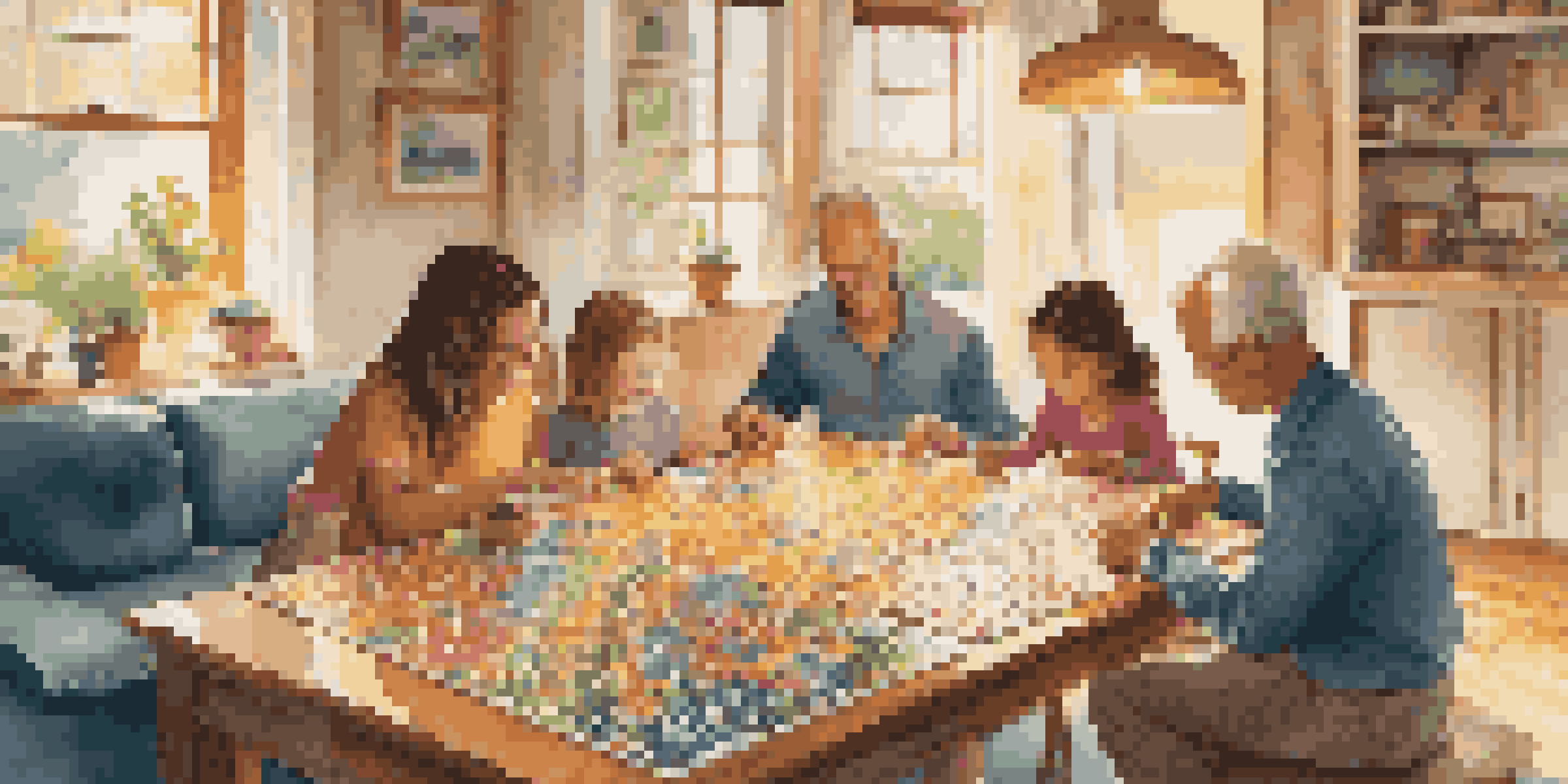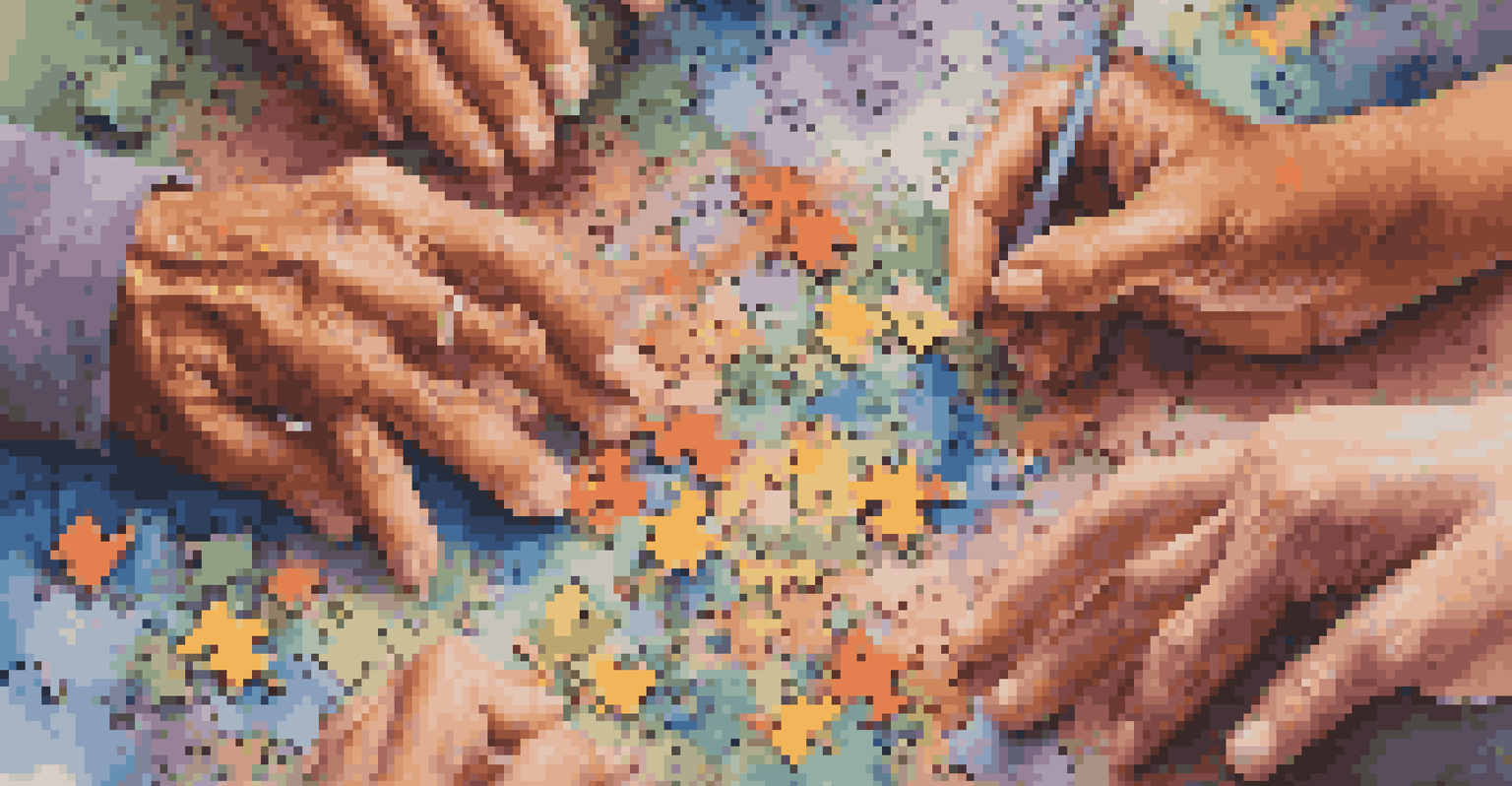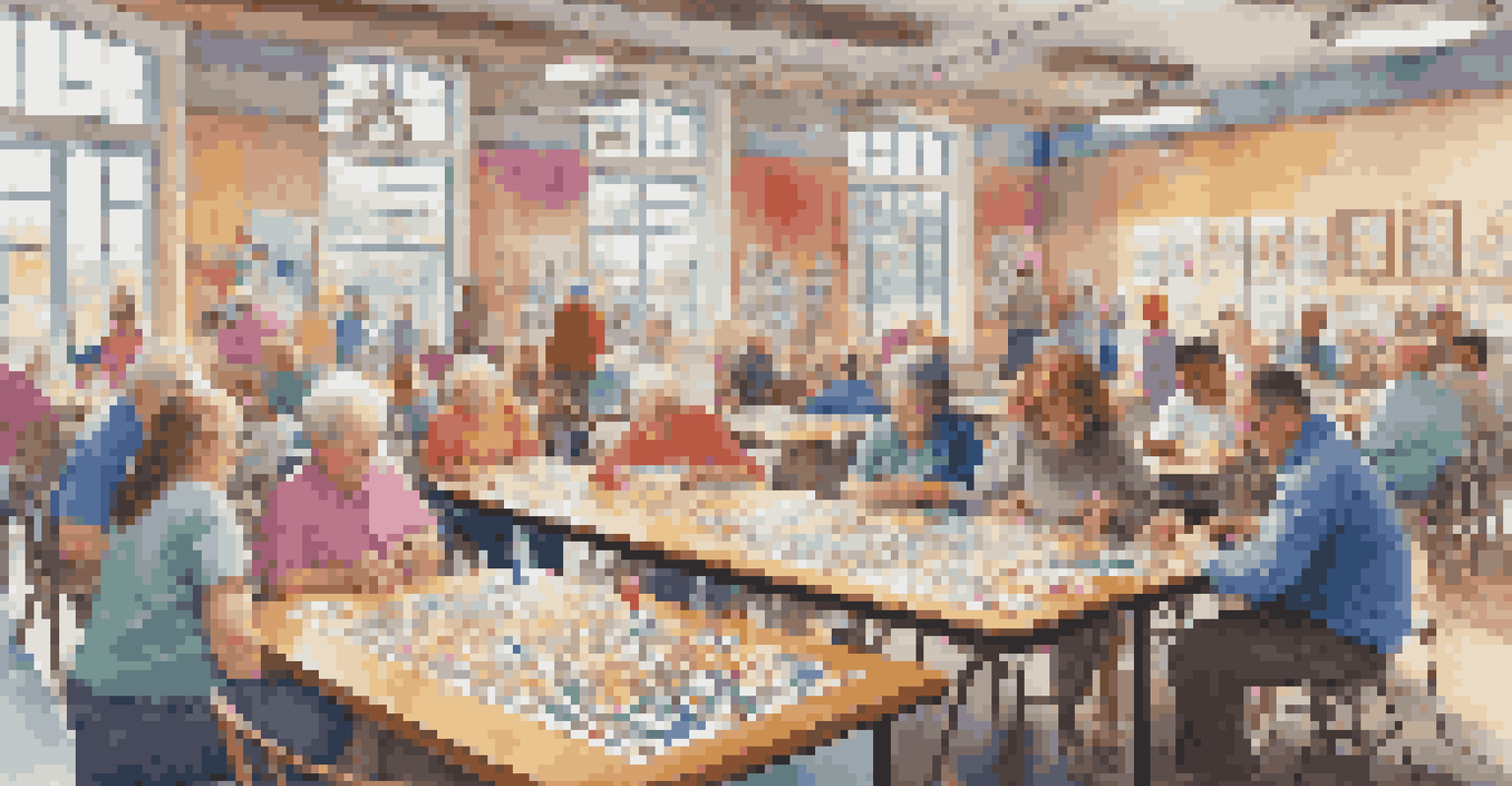Jigsaw Puzzles as a Social Activity: Building Connections

The Rise of Jigsaw Puzzles as a Social Trend
In recent years, jigsaw puzzles have made a significant comeback as a popular pastime. More than just a solitary activity, they have become a way for friends and families to bond. This resurgence is partly due to their ability to provide a relaxed environment for conversation and connection.
Puzzles are not just a game; they are a way to connect with others and create lasting memories.
People are discovering that working on a puzzle together can create a shared experience that fosters teamwork and communication. As individuals piece together the puzzle, they naturally engage in discussions, share stories, and create lasting memories. It's a simple yet effective way to strengthen relationships in an increasingly digital world.
Additionally, the social aspect of jigsaw puzzles has expanded online, with virtual puzzle competitions and communities forming. This new dimension allows puzzle enthusiasts to connect with others across the globe, proving that the joy of puzzling can indeed transcend physical boundaries.
Building Connections Through Teamwork
One of the most rewarding aspects of working on a jigsaw puzzle is the teamwork involved. When tackling a complex puzzle, each person's unique perspective and skills can contribute to the solution. This collaborative effort not only enhances the enjoyment of the activity but also promotes a sense of unity among participants.

As friends or family gather around the table, they must communicate effectively to identify pieces and strategize their approach. This process can lead to lighthearted banter, problem-solving discussions, and a shared sense of accomplishment when a piece finally fits. Such interactions help deepen bonds and create a supportive atmosphere.
Puzzles Foster Social Connections
Jigsaw puzzles create shared experiences that enhance communication and strengthen relationships among friends and family.
Moreover, these shared moments can be particularly valuable during challenging times. When life feels overwhelming, the act of working together on a puzzle can serve as a comforting distraction, allowing individuals to connect emotionally and mentally, reinforcing their relationships in the process.
Creating Lasting Memories with Every Piece
Every puzzle completed is a memory made. The laughter, the occasional frustrations, and the satisfaction of seeing the final image come together create stories that can be cherished forever. Each session becomes a cherished memory, a snapshot of time spent together that can be revisited in conversations.
The joy of puzzling is not just in the completion, but in the connections made along the way.
Additionally, many families have traditions surrounding puzzle completion, such as setting aside time during holidays or weekends. These traditions not only encourage bonding but also create a sense of belonging and continuity. As new generations join in, they add their own memories to the family puzzle history.
So, next time you’re working on a jigsaw puzzle, take a moment to appreciate the connections being built with each piece. It’s not just about completing the image; it’s about the laughter, the teamwork, and the memories that will last a lifetime.
Bridging Generational Gaps Through Puzzles
Jigsaw puzzles are unique in their ability to bring together people of all ages. Whether it’s grandparents, parents, or children, everyone can join in the fun. This intergenerational activity allows for the sharing of skills and knowledge, making it a rich learning experience for younger participants.
As older family members guide younger ones through the process of finding and fitting pieces, they pass down not just puzzle skills but also life lessons. Stories about the past often surface during these sessions, providing a window into family history and strengthening bonds across generations.
Teamwork Builds Stronger Bonds
Collaborating on puzzles promotes teamwork and problem-solving, leading to deeper emotional connections during the process.
Furthermore, the patience required to solve puzzles can teach valuable qualities like perseverance and teamwork. These skills are important in both personal relationships and broader social contexts, making puzzle-solving a meaningful activity for families looking to connect.
The Therapeutic Benefits of Puzzling Together
Engaging in jigsaw puzzles is not only a social activity but also a therapeutic one. The focus required to fit pieces together can serve as a form of mindfulness, helping individuals to relax and unwind. When shared with others, this therapeutic aspect can be amplified, creating a calming group atmosphere.
As people work together on a puzzle, they often find themselves discussing their day, sharing worries, or simply enjoying each other's company. This open communication fosters emotional support, which can be especially beneficial during stressful times.
Additionally, the satisfaction of completing a challenging puzzle together can boost mood and promote feelings of accomplishment. In this way, jigsaw puzzles become more than just a game; they become a shared journey toward emotional well-being.
Making New Friends Through Puzzle Groups
Joining a jigsaw puzzle group can be a fantastic way to meet new people. Many communities have clubs dedicated to puzzle enthusiasts, providing a welcoming space for individuals to connect over a shared interest. These groups often host regular meetings where members can bring their own puzzles, share tips, and work together.
The social environment encourages conversation and camaraderie, making it easier for individuals to form friendships. As members collaborate on puzzles, they bond over the challenges and triumphs of puzzling, creating a strong sense of community.
Puzzles Unite Generations
Jigsaw puzzles bridge generational gaps by allowing family members of all ages to bond over shared skills and stories.
In an age where many feel isolated, these groups offer a refreshing opportunity to engage socially. The shared goal of completing a puzzle can break down barriers and foster connections that might not have occurred in other settings.
The Future of Jigsaw Puzzles as a Social Activity
Looking ahead, jigsaw puzzles are likely to continue evolving as a social activity. With the rise of technology, we may see more innovative platforms that allow for virtual puzzle sessions, enabling friends and family to connect from anywhere in the world. This shift could make puzzle-solving even more accessible and inclusive.
Moreover, as more people recognize the benefits of puzzles for mental health and social bonding, we can expect to see an increase in community events centered around puzzle-solving. These events can serve as fun gatherings that promote both social interaction and cognitive engagement.

Ultimately, jigsaw puzzles have the potential to remain a beloved social activity for years to come, helping people forge connections and create lasting memories one piece at a time.